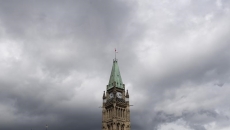The Bank of Canada says its concerns are mounting that households are piling on too much debt and posing what the central bank says is a key vulnerability to the economy.
In its latest financial system review, the Bank of Canada said Thursday that many households have taken on large mortgages compared with their income, limiting their flexibility to deal with an unforeseen financial shock like the loss of a job.
The bank notes that total household debt has increased by four per cent since the start of the pandemic, picking up sharply since the middle of last year as the housing market started to heat up.
WATCH: Governor Macklem takes questions from the media following the release of the Financial System Review. #economy #cdnecon https://t.co/lMAad4Dp3y
— Bank of Canada (@bankofcanada) May 20, 2021
The Bank of Canada's report says the boom may help the economy rebound in the short-term, but could lead to a future bust if households have to cut spending because of another downturn in the economy.
The bank's latest review of the risks to the country's financial system also highlighted concerns about a too-soon withdrawal of pandemic aid for businesses.
For businesses, the concern is about their future viability when government support ends because much remains uncertain about what post-pandemic life and economic activity will look like, the central bank said.
For banks and insurance companies, the Bank of Canada said cybersecurity remains one of their top three concerns.
But it is housing and high household debt levels that plays a key role in the central bank's report Thursday.
Government aid and work by the central bank to drive down interest rates during the pandemic have helped put a financial floor on households and businesses, many of whom have fared far better than could have been expected during the economic downturn.
The report adds that the activity in the market and troubling figures on mortgages is reminiscent of 2016 just before stress tests were brought in on mortgage applications to make sure buyers could handle payments if rates went up.
House prices were up 23 per cent nationally relative to one year earlier, the bank said in its report. The Canadian Real Estate Association said this week that the average price of a home sold in Canada in April was just under $696,000.
The bank said the recent surge in prices is more widespread in cities than five years ago when things were largely concentrated in and around Toronto and Vancouver. In the bank's view, the Greater Toronto Area, Hamilton and Montreal are overheated and Ottawa is on the precipice of joining them.
With house prices rising, and supply of available homes lagging demand, some homeowners may be tempted to buy now out of concern that they won't be able to afford something in the future.
The bank's report warns that some households are biting off more than they can chew with a new mortgage, making them more vulnerable to rising interest rates when it comes time to renew their loan.
A federal bank regulator is looking at tightening the test for uninsured mortgages, and the Trudeau Liberals have been pressed to do something similar for insured mortgages.
The federal budget last month proposed a one per cent foreign-buyers tax on vacant property. The central bank said the measure "would likely reduce speculative demand in the housing market."
On Wednesday, Finance Minister Chrystia Freeland met with a panel of private sector economists. A readout from the meeting provided by Freeland's office noted that she asked about the housing market and affordability issues.
This report by The Canadian Press was first published May 20, 2021.






